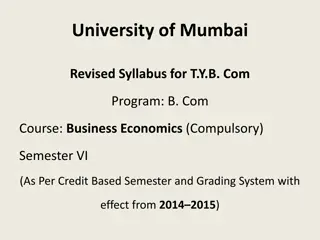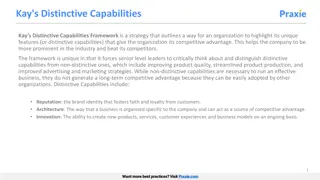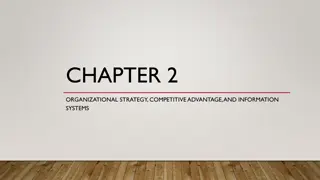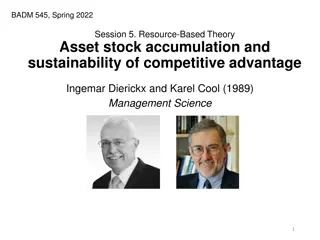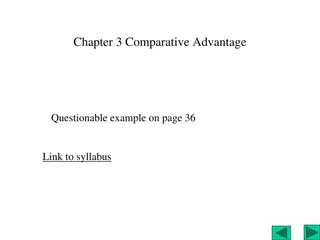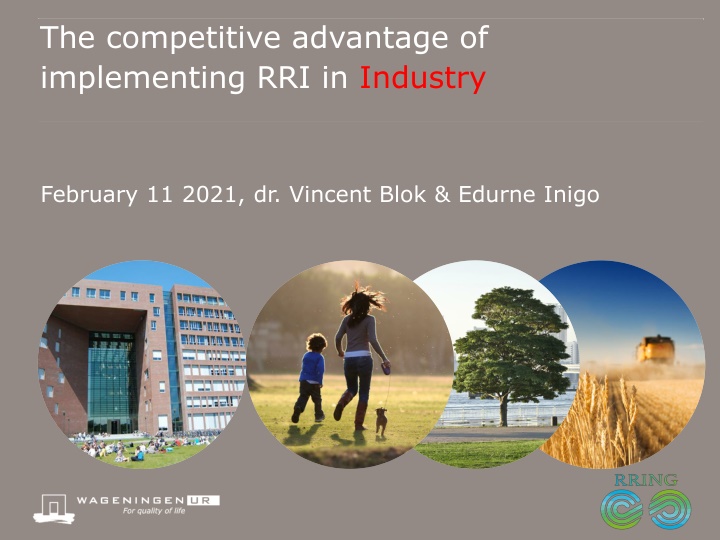
Implementing Responsible Innovation in Industry: Overcoming Barriers and Driving Competitive Advantage
Explore the challenges and benefits of Responsible Innovation (RI) in industry, focusing on developing a competitive advantage through RI practices. Discover barriers such as power imbalances, information asymmetries, and fears of knowledge leakage. Uncover drivers like social acceptance, stakeholder needs, and increased efficiency in the innovation process. Gain insights into how RI can enhance reputation and tap into new markets while navigating obstacles like regulatory hurdles, intellectual property protection, and lack of consumer awareness.
Download Presentation

Please find below an Image/Link to download the presentation.
The content on the website is provided AS IS for your information and personal use only. It may not be sold, licensed, or shared on other websites without obtaining consent from the author. If you encounter any issues during the download, it is possible that the publisher has removed the file from their server.
You are allowed to download the files provided on this website for personal or commercial use, subject to the condition that they are used lawfully. All files are the property of their respective owners.
The content on the website is provided AS IS for your information and personal use only. It may not be sold, licensed, or shared on other websites without obtaining consent from the author.
E N D
Presentation Transcript
The competitive advantage of implementing RRI in Industry February 11 2021, dr. Vincent Blok & Edurne Inigo
Introduction Responsible Innovation in Industry faces particular Challenges: Dominant business logic, information asymmetry, inter- and intra-value conflicts in stakeholder engagement (Blok & Lemmens, 2015) Responsible Innovation in industry is underrepresented in current research Wageningen Research Strategy: De Facto responsible innovation in Industry (Blok et al. 2015; Lubberink et al. 2017; 2018; Brand & Blok 2019; Garst et al. 2017; Long et al. 2020) Research Question: How can a competitive advantage based on RRI like practices be developed and sustained?
What are the barriers of SE in RI processes and which management processes are helpful? (Blok etal.2015) Features Literature Different visions, goals, motives and values among sectors Power imbalances Cases Interaction Time load Information asymmetries to gain competitive advantages Lack of control Fear of knowledge leakage Transparen- cy Uncertainty whether the product will be launched Collaborations of stakeholders with other companies (although not experienced as a barrier by the companies) Grey area in health Not applicable in case of industrial RI Investment investor decisions taken by Responsive- ness Uncertain innovation process: loss of legitimacy Company is responsible for product and policy Co-respon- sibility
Main results: drivers and barriers Drivers: Avoiding uncompetitive regulation. Increasing social acceptance Incorporating stakeholder needs and tapping onto new markets. Increasing the efficiency of the innovation process Reputational effects. The more you try to involve the local people, give them the jobs, give them the satisfaction of working in a big organization while staying in their own place, the benefit is mutual. Both for them as well as for us, because you get a license to operate, people admire the organization and the local administration also admires the organization (India, M, energy) Barriers: Obstacles during the research and innovation process (such as lengthening the time-to- market) Protecting intellectual property. Lack of consumer awareness, Barriers derived from the institutional environment. Here the awareness about the organic and good food and everything is much lower than in the West. All that makes our life really, extremely difficult (Serbia, F, agriculture) 9
Main results Some differences in terms of attitudes and engagement in RRI-like practices across regions albeit minor. Both procedural and outcome dimensions were relevant. Adaption to local environments when it comes to particular practices. Example: gender equality 10
Main results Different responses depending on local regulations and focus placed on the development of competitive advantages at the micro and macro levels: importance of domain specific considerations in RRI- like responses. [ ] In Europe, we can't perform science to do business based on gene editing, to develop final products. It's very complicated and it's not considering them as gene editing but as GMO, which we know is not so positively accepted by the society. This problem now to my knowledge is discussed in the very top European level, but still, the legislation is there and then the interpretation is standby or decisions are really hard to change things back to where they were, at the same time, US and Japan and other countries are moving forward 11
Main results Importance of network approaches and second-order reflexivity, and need to adapt RRI-like practices to local contexts to maximise their benefits for competitive advantage. Bring in the people you need to bring in that have that [ethical assessments]. If you have somebody who was stuck inside in a lab developing new sockets or whatever, they're thinking about the technology. They're not necessarily thinking about the bigger picture. It's important that it is covered somewhere . (Ireland, M, ICT) Strategic approaches to RRI and their proper integration in organizational R&I routines showed an improved relation with competitive advantage. It's the right thing, but also we find that if you're developing technology, having as diverse a number of view policy as possible leads to better innovation. If you have a mix of genders and mix of backgrounds, a mix of cultural backgrounds, national backgrounds, you end up identifying potential challenges much earlier [ ] (Europe, Africa and SE Asia, F, ICT) 12
Recommendations for industry 1. Be responsive to context 2. Participate in standards development 3. Participate in networks 4. Apply both process and outcome approaches 5. Do and tell 6. Engage and protect 7. Embed RRI-like practices into company strategies 13
Recommendations for policy-makers 1. Facilitate contextual factors 2. Engage in participatory processes when regulating about controversial research and innovation processes 3. Balance short-term and long-term development issues Recommendations also provided for: RPOs, RFOs, investors, civil society, and NGOs and other association bodies 14
Thanks you! Contact us via: Vincent.blok@wur.nl






